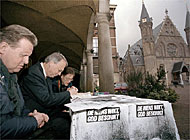Dutch decision kindles right to die controversy

A decision in the Netherlands to legalise euthanasia has re-ignited the debate in Switzerland over the practice of ending the lives of terminally ill patients.
Swiss churches have condemned the Dutch move saying life is God-given and cannot be cut short. However, organisations which support people’s right to die have called for changes in the interpretation of Swiss law.
Active euthanasia is forbidden in Switzerland but “indirect active euthanasia” is allowed. A physician may use drugs to relieve the pain and suffering of a patient despite the fact that treatment may lead to the death of the patient. Experts say that up to 10,000 people a year are “helped” to die in this way.
“No-one should deliberately cut short a life,” said Marc Aellen, spokesman of the Swiss Bishops Conference. “The church is committed to the preservation of life at all costs and encourages palliative care.”
Palliative care aims to alleviate suffering rather than end it. Opponents of euthanasia say if doctors could guarantee a high quality of life up to the moment of natural death, euthanasia campaigners would lose their central argument.
Exit, a Swiss organisation which favours assisted suicide, has welcomed the Dutch decision.
“I’m delighted that the issue is back in the spotlight,” said Exit president, Elke Baezner. “Despite all the infrastructure in our highly developed industrialised countries and despite all the financial possibilities, there comes a point for some people when they simply can’t go on any longer.”
Euthanasia has many definitions. It is popularly taken to mean the practice of helping severely ill people die, either at their request or by taking the decision to withdraw life support.
Under the new Dutch law, the definition is narrower and means the termination of life by a doctor at the express and voluntary wish of a patient.
In Switzerland, the practice of assisted suicide is already legal. If there is no ulterior motive, it is not an offence to provide drugs to someone who wants to die.
“The Dutch are very courageous to have done this,” said Baezner. “But qualified hospice staff as well as doctors should be authorised to intervene.”
Professor Meinrad Schär, a former professor of social and preventive medicine at the university of Zurich, was on the working group set up by the Swiss justice ministry between 1997 and 1999 to consider legalisation of euthanasia.
“Our commission decided that active euthanasia in Switzerland should be introduced and it should be decriminalised. It should be regulated and controlled which would basically legalise the status quo.”
According to opinion polls, 80 per cent of the Swiss population support moves to end the lives of terminally ill patients in certain highly prescribed circumstances.
On Tuesday, The Netherlands became the first country to legalise euthanasia.
Under the law, euthanasia will be administered only to patients who have continuous, unbearable and incurable suffering. A second opinion will be required, the patient must be judged to be of sound mind, and the request to die must be made voluntarily, independently and persistently.
by Vincent Landon

In compliance with the JTI standards
More: SWI swissinfo.ch certified by the Journalism Trust Initiative
You can find an overview of ongoing debates with our journalists here. Please join us!
If you want to start a conversation about a topic raised in this article or want to report factual errors, email us at english@swissinfo.ch.